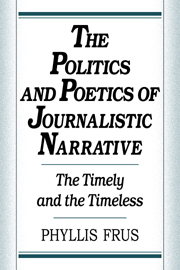Book contents
- Frontmatter
- Contents
- Preface: True Stories
- Acknowledgments
- Introduction: What Isn't Literature
- 1 Writing After the Fact: Crane, Journalism, and Fiction
- 2 “News That Stays”: Hemingway, Journalism, and Objectivity in Fiction
- 3 News That Fits: The Construction of Journalistic Objectivity
- 4 Other American New Journalisms: 1960s New Journalism as “Other”
- 5 The “Incredibility of Reality” and the Ideology of Form
- 6 Freud and Our “Wolfe Man”: The Right Stuff and the Concept of Belatedness
- Conclusion
- Notes
- Works Cited
- Index
Introduction: What Isn't Literature
Published online by Cambridge University Press: 14 September 2009
- Frontmatter
- Contents
- Preface: True Stories
- Acknowledgments
- Introduction: What Isn't Literature
- 1 Writing After the Fact: Crane, Journalism, and Fiction
- 2 “News That Stays”: Hemingway, Journalism, and Objectivity in Fiction
- 3 News That Fits: The Construction of Journalistic Objectivity
- 4 Other American New Journalisms: 1960s New Journalism as “Other”
- 5 The “Incredibility of Reality” and the Ideology of Form
- 6 Freud and Our “Wolfe Man”: The Right Stuff and the Concept of Belatedness
- Conclusion
- Notes
- Works Cited
- Index
Summary
“I'll Never Forget the Day I Read a Book”
It wasn't a history,
I know because it had no plot.
It wasn't a mystery,
Because nobody there got shot.
– Jack Barnett and Jimmy DuranteThere may be no gods, but there is a pattern: names by themselves may have no magic, but the act of naming, the physical utterance, obeys the pattern.
– Pynchon, Gravity's RainbowDespite the recent efforts of some academic literary theorists and philosophers to break down the barriers between literature and “Other” categories of discourse – that is, between fiction and nonfiction – and the insistence of a few writers that what they are doing makes these distinctions meaningless, most critics and readers continue to respect the terms, especially in regard to news on the one hand and novels on the other. No matter what criteria theorists specify to define the “literary,” it appears that journalism in general does not meet them. Because journalism is dependent on the occasions that bring it into being, supposedly only those seeking evidence from the past, such as historians, will find its reports useful when our interest in these occasions wanes. It is thus easily dismissed because of its ephemerality. Related to this is Aristotle's distinction between history, which is tied to actuality and thus to the “particular,” and poetry's representative, and therefore “universal,” subject matter and appeal; journalism, by definition, has merely “local” interest.
- Type
- Chapter
- Information
- The Politics and Poetics of Journalistic Narrative , pp. 1 - 12Publisher: Cambridge University PressPrint publication year: 1994

